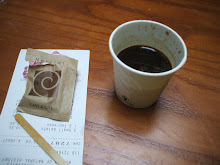The other day, a few of us were sitting outdoors at one of the few sidewalk spots in Carytown. It was a gorgeous Friday afternoon — a little sultry for mid-March, but otherwise the sort of afternoon that brings everyone out to stroll. L and a friend had gotten a bottle of rosé and a cheese plate. I had an Avery DuganA. This particular restaurant is the sort of place where the taps rotate regularly, and the draft and bottle selection is a reliable mix of domestic and international craft beers. They also don’t carry any brands from the Big 3 — and very few of the more common imported beers.Walk in there, and you won’t be able to order a Bud or a Miller Lite. They like it this way, and so do the rest of us craft beer elitists. [Insert a tongue-in-cheek tone.]
Occasionally their decision (a decision shared by a few other places in town) causes a bit of a hiccup in business. I’ve heard people order a Bud or a Miller or what-have-you only to be told that the restaurant doesn’t carry those beers. I have also heard these same customers incredulously question the bartender. Why wouldn’t they? The response varies based on the personality of the bartender and how difficult the customer has been. In general, though, they’re very good about redirecting customers to beers they might like — a pilsner or a kölsch in place of a Bud, for instance.
On this stellar afternoon where I happened to be sitting outdoors rather than at the bar, I heard a waiter take a very different approach. When a customer ordered a Coors Light — a surprise order since he seemed to have been there before — the waiter patiently said they didn’t have Coors Light, but they had a nice light-bodied beer on draft, if he’d like that. The customer said sure, that’d be fine.
I watched as the waiter brought him a North Coast Scrimshaw Pilsner. The man seemed pleased and after a little while ordered another. He also never asked what he was drinking.
My first instinct would have been to tell him what he was drinking. Perhaps he’d want to order it again. Or perhaps he just wanted a beer. A fizzy, yellow beer. And that’s where my instinct to educate him — to geek out about the beer — would have been wrong. Sometimes people just want an uncomplicated beer, uncomplicated by names and hop descriptions and grain bills, and the farther I go into the craft and artisanal beer movement, the more I think the simplicity of just having a beer gets forgotten.
This certainly isn’t the end of the discussion, but I have started to realize that we need a balance in the craft beer world. We need a balance for people who just want a beer — a desert island beer — and a way for them to know that there are more than dark and light varieties without losing them in the intricacies of barrel-aging or food pairing. In a manner, we need to create a broader language that brings even that man at the sidewalk restaurant and the waiter serving him into the fold, without losing the beauty of a cold beer on a hot day.
skip to main |
skip to sidebar

I'm back. Have a blast, y'all.

About Me
Blog Archive
- June (1)
- July (1)
- May (5)
- January (3)
- December (1)
- November (2)
- September (4)
- August (11)
- July (7)
- June (1)
- May (2)
- April (2)
- March (5)
- February (4)
- January (4)
- November (3)
- October (3)
- September (3)
- August (1)
- July (3)
- April (2)
- March (5)
- February (3)
- January (7)
- December (8)
- November (12)
- October (5)
- September (8)
- August (6)
- July (5)
- June (14)
- May (13)
- April (24)
- March (21)
- February (22)
- January (22)
- December (20)
- November (26)
- October (24)
- September (35)
- August (27)
- July (36)
- June (21)
- May (26)
- April (28)
- March (27)
- February (20)
- January (38)
- December (26)
- November (11)
- October (32)
- September (33)
- August (30)
- July (36)
- June (34)
- May (50)
- April (36)
- March (3)
- January (3)
- December (3)
- November (3)
- August (6)
- July (4)
What I Like
- A List Apart
- Accidental Creative
- AdLand
- AdRants
- Atrios
- Batocchio
- Byrd House Market
- Chowhound
- Creating Passionate Users
- daddytypes.com
- Daily Kos
- Design Observer
- design*sponge
- Epicuriousity (John Haddad)
- Flickr shots
- Gawker
- Getting Real - 37 Signals
- Gothamist
- Incertus
- Phil's bookmarks (web design and more)
- river city food and wine
- Smeltery fonts
- TreeHugger
- Veer
- Vitaly Friedman's fonts
- Wonkette
- Wornamental, Thornamental Design
- Xtcian
- zefrank
